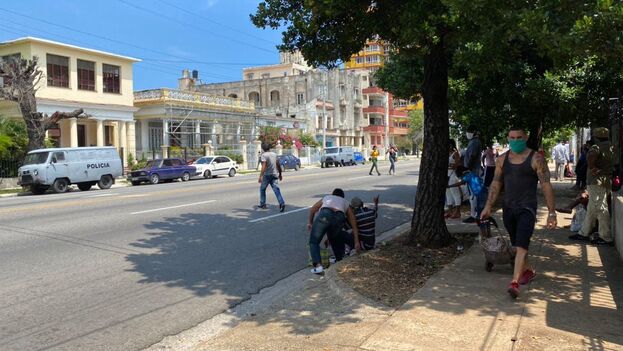
![]() 14ymedio, Luz Escobar, Havana, 12 September 2020 — If it weren’t for the pandemic, it would seem that the group gathered on 23rd Street is waiting for a bus. But this Friday, people in front of the Municipal Court at the Plaza de la Revolución were waiting to find out the fate of their relatives, detained for allegedly violating the measures decreed in Havana to stop the spread of Covid-19.
14ymedio, Luz Escobar, Havana, 12 September 2020 — If it weren’t for the pandemic, it would seem that the group gathered on 23rd Street is waiting for a bus. But this Friday, people in front of the Municipal Court at the Plaza de la Revolución were waiting to find out the fate of their relatives, detained for allegedly violating the measures decreed in Havana to stop the spread of Covid-19.
Dozens of eyes did not lose sight of the arrival of police vehicles, the movement of the uniformed men, or the shout that, from time to time, a policeman would voice from the front door of a large house on the opposite sidewalk. At any time, a son, a brother or a father might be transferred to the site to be tried for failing to comply with Decree 14/2020.
“Here we are, waiting for them to bring our son but they tell us that it will be later, that now they are bringing the people from Cerro and we are from Centro Habana,” Marta, a woman who is waiting, leaning on a wall on 23rd Street with her husband and two children, tells 14ymedio.
Some have settled on the sidewalk, others have been able to bring a small plastic bench, a bottle of water and lots of patience for the long hours of waiting. They are people from all social classes and neighborhoods in Havana. What little unites them is the anxiety of not knowing what happened to the relative who did not return home and they found out shortly after he was detained.
Some have settled on the sidewalk, others have been able to bring a small plastic bench, a bottle of water and a lot of patience for the long hours of waiting
Under her umbrella, Marta harshly criticizes the injustice that has been committed against her son. “They are telling families that the penalties are always less severe for people who are employed, but I do not understand. My 21-year-old son lost his job like many others because of this Covid.”
From across the street, an officer yells: “Reinaldo, Reinaldo.” Last names are not necessary because several members of a family spring up and cross the light traffic on the avenue, under a sun that can melt stones. Only a relative can access the oral hearing. “Go in, since you are his mother, we will be waiting for you out here,” someone says. The woman, escorted by two officers, enters the house.
Inside, the trial takes place, a quick process that seeks not only to convict the offenders but also to send a message to the rest of the public. The trials are designed to serve as an example, to warn others not to hang out on the streets without a mask, not to go out after the curfew has started, and not to try to shop in stores outside their municipality.
The front yard of the courthouse is packed with waiting uniformed police officers, looking bored and tired, dozing with their elbows on their knees. Two small buses, the kind traditionally used for the transfer of prisoners, are parked outside.
The front yard of the courthouse is packed with uniformed policemen who wait, they look bored and tired
“They are the sector leaders, who are pressured to come and give testimony of the offense committed,” says another woman. “Here they conduct trials from everywhere, from Cerro as well as from Plaza or Centro Habana,” she adds. “I still don’t know why they took my brother. I know he’s here because I got a call last night.”
A young woman, with a little girl in her arms, approaches the group. In a timid voice, she explains that her husband was taken away on the 21st of last month and asks several questions: “Do you know what sanctions they are handing out? Do you have any idea where they will transfer him after this?” A buzz of solidarity is heard, but a voice calls for calm.
The young mother needs to go to the bathroom. “Wait, I’ll come with you,” offers another woman, who leaves her purse in the hands of her husband before crossing the deserted avenue again. They return to the subject when they return. The conversation is full of unanswered questions. Nobody knows which prison they are taking the detainees to, nor what penalties they are applying.
“According to what they have told me, the punishment depends a lot on the circumstances and the person”, says a man who had not spoken up to that point. Silence runs through the group. Perhaps each one calculates the situation of his relative. Does he work or not work? Does he have a criminal record?
Some take refuge in the hope that their relative will walk out of the trial with just a fine, cross the sidewalk and they will hug in the September sun. The officer’s shout breaks the brief silence. “Maykel, Maykel” is heard, and a woman with a small child crosses the sidewalk.
Translated by Norma Whiting
____________
COLLABORATE WITH OUR WORK: The 14ymedio team is committed to practicing serious journalism that reflects Cuba’s reality in all its depth. Thank you for joining us on this long journey. We invite you to continue supporting us by becoming a member of 14ymedio now. Together we can continue transforming journalism in Cuba.
